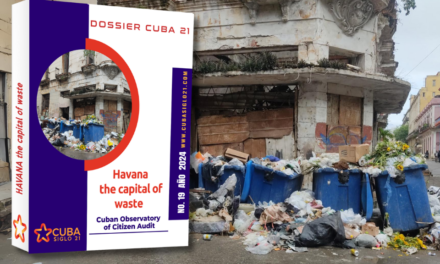Descargar informe completo en pdf (español)
Download complete report in pdf (English)
Cuba has one of the largest water reservoir systems in Latin America. However, most of the population does not receive water on a regular basis in their homes. The cause does not lie in external sanctions, divine providence, or natural disasters. The reason that more than 67% of the population (7,435,690 citizens) does not receive water in a stable manner today is the result of the abandonment of the maintenance of the water network for more than half a century while resources were invested in building more and more reservoirs for propaganda purposes. Investments prioritize the provision of water to the tourist centers of GAESA’s oligarchic conglomerate and are not oriented to guarantee the right of accessing drinking water for the citizens.
Cuba’s water supply is insufficient and marked by the lack of access to it for a significant portion of the population. Although the government has officially acknowledge that about 1 million Cubans lack access to potable water through aqueducts, the real figure is estimated to be almost double: 2 million people. In addition, more than 475,000 Cubans receive water on a permanent basis through tanker trucks (pipas), and 67% of the population does not have a daily supply service. This is equivalent to 7,435,690 Cubans.
Water service has deteriorated due to bad infrastructure maintenance including lack of proper repairs of pumps and pipelines and poor management of water resources. This has led to a series of problems such as contamination of water sources, salinization, and the loss of up to 60% of pumped water due to leaks in the pipelines of the distribution networks.
The disparity in access to water between the population and the tourist sector is highlighted. While tourist hotels receive a constant supply of water, many communities lack adequate service. It is evident that investments in water infrastructure are prioritized for tourism instead of aiming at meeting the basic needs of the population. For example, the construction of a 27 km network of pipes to ensure water supply to the tourist center located in the Jardines del Rey archipelago, which hosts 20% of the international tourism that arrives in the country annually.
Wastewater treatment is deficient and contributes to environmental contamination, further aggravating Cuba’s water crisis.
In summary, there is an urgent need to address the structural and management problems affecting water supply in Cuba. The water crisis not only affects the quality of life of millions of Cubans, but also has serious implications for public health and the environment.
Water supply in figures
- Nearly 2 million Cubans (1,884,000) do not have access to potable water, although the government recognizes only less than 1 million (956,000).
- More than 475,000 Cubans receive water in tanker trucks (pipas) on a permanent basis.
- 67% of the population does not have a daily water supply service: 7,435,690 Cubans.
- Water supply to homes in Cuba:
- 15% receives stable and permanent water;
- 17% do not have potable water services.
- 40% receive water 4 to 6 days per week.
- 27% less than 4 days a week.
- 1 in 4 seniors over 70 suffer from lack of water supply.
- Havana pumps 1.55 million cubic meters of water daily to the capital, of which the city receives only 0.47 million cubic meters.
- A “aguador” in Havana charges $500 pesos (almost a quarter of the minimum wage) to fill a 55-gallon tank.
- 30% of the country’s average rainfall is dammed before it reaches the sea.
- One Olympic swimming pool for every 3 Cubans is the water capacity in Cuba’s reservoirs: 9,128 million cubic meters (2.4 trillion gallons).
- Cuba’s water supply system (242 reservoirs and thousands of kilometers of canals, ditches, and aqueducts) is largely unsustainable and remains partly inactive.
Conclusions
- The problem of water shortage in homes is not due to the scarcity of this common good in the national territory, but to its terrible administration and the negligence for decades in the maintenance of the distribution networks, the delay in the introduction of new technologies that rationalize its optimal industrial use and the scarcity of parts offered to the population to avoid waste in domestic use. In this sense, the crisis of this vital service has similar roots to the crisis of the national energy system (SEN).
- Wastewater treatment is deficient and becomes more serious in times of crisis, such as the one that has occurred since the collapse of the Soviet Union in 1991. The return to the environment of water contaminated by agricultural, industrial, or domestic use reduces the availability of water for consumption. It is common in agricultural and urban areas that lack treatment systems. Ironically, the collapse of the economy, the sugar industry as well as other industries reduces the load of pollutants in the environment and contributes to the slow natural cleansing of the waters. The phenomenon is evident in Havana Bay, for example.
- The tendency to continue building large hydraulic works aggravates the problem instead of promoting the best use of available water through the maintenance of the networks.
- The massive construction of hotels in urban areas where there are already problems with water supply and wastewater treatment reflects the insistence on preserving water availability for tourism investments without improving water service for the population. The impact of high-water consumption by these hotels and in some cases by their golf courses on the limited water table, especially in already overexploited areas such as the Hicacos Peninsula (Varadero), is also not properly taken into account.
- The accusations in relation to this already serious situation against U.S. sanctions and blaming natural disasters as its cause -all of which are promoted by Cuban propaganda and sometimes are irresponsibly reproduced by the media and multilateral forums- is false. But ordinary Cubans do not fall into these propaganda traps. When they turn on the tap and no water come out, they know who to blame: an obsolete regime run by incompetents.
Descargar informe completo en pdf (español)
Download complete report in pdf (English)







